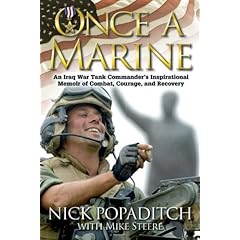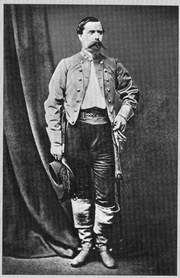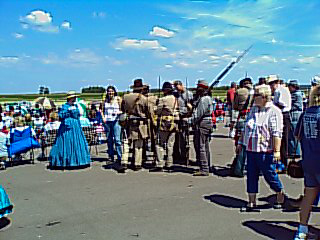Category:
General News
Please forgive my being quiet for the past couple of days. I had a major deadline to meet yesterday–I had two different briefs due yesterday, and had to allow my job to get in the way of my hobby. One brief was time-stamped 4:53 and the other 4:54–the Clerk of Court’s office closes at 5:00–meaning that I met the deadline. Now it’s back to business as normal.
 I want to recommend a great book about a true American hero to you. Gunnery Sergeant Nick Popaditch enlisted in the Marine Corps in 1986 and served his country with great honor for 18 years. A photographer snapped his photo in Baghdad in 2003, smoking a victory cigar, with the downed statue of Saddam Hussein behind him. He became known as the “Cigar Marine” as a result of that iconic photograph, which appears on the dust jacket of the book.
I want to recommend a great book about a true American hero to you. Gunnery Sergeant Nick Popaditch enlisted in the Marine Corps in 1986 and served his country with great honor for 18 years. A photographer snapped his photo in Baghdad in 2003, smoking a victory cigar, with the downed statue of Saddam Hussein behind him. He became known as the “Cigar Marine” as a result of that iconic photograph, which appears on the dust jacket of the book.
In 2004, while commanding a tank in Fallujah, Iraq, Gunny Pop, as he’s known, stopped a rocket propelled grenade with his face and lived to talk about it. Although he was awarded a Silver Star for his valor that day, Nick lost an eye and was critically wounded, but he survived. He was medically discharged from the Corps in 2005.
Gunny Pop has written an amazing memoir of his ordeal titled Once a Marine: An Iraq War Tank Commander’s Inspirational Memoir of Combat, Courage, and Recovery that was recently published by Savas-Beatie. Because of my relationship with Ted Savas, I’ve known about this forthcoming book for quite a while, and had the good fortune to read the manuscript before it was published.
I can’t say enough good things about this particular book. Fast-paced and extremely well-written, Gunny Pop has written a simultaneously fascinating and incredibly moving narrative that details his military career and the ordeal of his wounding and recovery from that horrible wound. A husband and father, his memoir tells all about how that day in Fallujah affected his life and the lives of his loved ones. Gunny Pop represents the best that the United States Marine Corps has to offer, and we all have much to learn from the lessons of his life.
Although there’s obviously a great deal of difference between modern warfare and what we study in the Civil War, those of us who study the Civil War, and in particular, those of us who study the stories of the common soldiers who fought the Civil War, Gunny Pop’s story has a lot to offer. The impact on his life and on the lives of his wife and children of the disabling wound that he suffered translates well to the ordeal of the common soldier of the Civil War, and there is much insight to be had as a result.
Do yourselves a favor and read this unforgettable book.
Scridb filter There is simply nothing like the sound of the ocean. It’s a sound that is at once relaxing, reaffirming, and tantalizing. There are times when just hearing the sound of the waves crashing into the shore are what I need to get myself back in kilter and back in balance.
There is simply nothing like the sound of the ocean. It’s a sound that is at once relaxing, reaffirming, and tantalizing. There are times when just hearing the sound of the waves crashing into the shore are what I need to get myself back in kilter and back in balance.
Due to job fluctuations and having to pay for care for my parents, Susan and I haven’t had a vacation since May 2006. Until now, that is. We’re in the Outer Banks of North Carolina this week, staying in a beach front house with some friends. I spent about an hour just flying a kite on the beach today. It was great therapy.
Other than to speak to the OBX Civil War Roundtable on Tuesday night, I am neither working nor doing anything Civil War while I’m here. This is about rest and recharging batteries, so don’t expect to hear from again until we get back to Ohio a week from today.
Enjoy the respite from me while I enjoy the respite from the world.
And go
Mike Block of the Brandy Station Foundation passed this item from the Shreveport Times newspaper along:
Louisianans headed to Poland to honor cavalry officer
Heros Von Borcke was a larger-than-life figure.BY JOHN ANDREW PRIME JPRIME@GANNETT.COM AUGUST 25, 2008
In a tribute to diversity, two Louisianans are headed to Poland to honor a Prussian aristocrat who fought for the Confederacy almost 150 years ago.
Chuck Rand, of Monroe, and Michael Bergeron, of Baton Rouge and Lake Charles, are en route to Eastern Europe to help dedicate a new U.S.-supplied military gravestone for Col. Johann August Heinrich Heros von Borcke, a soldier who served with the South in the 1860s and became a heroic figure among its cavalry corps. A 6-foot 4-inch prankster who fought with enthusiasm, and who almost could have been taken from an Arnold Schwarzenegger movie, his wounding in 1863 just before the Battle of Gettysburg is thought by some historians to have changed the course of the conflict.
“It is interesting that events that occurred in North America over 140 years ago not only still reverberate here but also have echoes in Europe,” said Rand, who is the national chief of staff for the Sons of Confederate Veterans.
Heros von Borcke is due his tombstone through a change in U.S. law that has recognized Confederate veterans as U.S. soldiers since the early 1900s.
While the government provides tombstones for former Confederates, they are different in design from traditional gravestones for other U.S. soldiers in that they have a pointed, rather than a rounded top.
The gravestone dedication and graveside memorial service, which will be open to the public and the media, will begin at 10:30 a.m. in Gyzin, also called Giessenbrugge.
Due to wars and boundary changes in Europe, the historic residence of the Von Borcke family was once in Prussia, a part of old Germany, but now is in modern Poland.
Von Borcke’s original tombstone was destroyed by the Soviets after they occupied the region following World War II.
Rand and Bergeron will represent the Sons of Confederate Veterans at the event.
The national heritage group has another Louisiana connection through its national commander in chief, Shreveport Charles McMichael. Rand and Bergeron will present the Von Borcke Family with a certificate from McMichael noting their ancestor’s service.
Von Borcke was an imposing presence in the Confederacy, as he was a top aide and confidante to James Ewell Brown Stuart, the famous cavalry leader.
A signal character in the June 9, 1863, battle of Brandy Station, the largest cavalry encounter of the war, he was known to give advice and guidance to Stuart.
But Von Borcke was badly wounded in the neck at the Battle of Middlesburg 10 days later. Stuart and his cavalry were absent from the July 2-4 Gettysburg battle at crucial times, and some historians believe that had Von Borcke been at Stuart’s side, he might have given Robert E. Lee and the Army of Northern Virginia better service when most needed.
“Upon returning to Germany, Col. Von Borcke wrote a book titled ‘Memoirs of the Confederate War for Independence,'” Rand said.
Von Borcke, who died in 1895 at the age of 60, flew the Confederate flag from the battlements at his ancestral castle and even named his daughter Virginia in tribute to his service.
The U.S. War Between the States is a topic of interest in Europe and other parts of the world, with re-enactors active in Germany, Poland, Australia and South America.
In addition to the Sons of Confederate Veterans and the United Daughters of the Confederacy, a company of German Confederate reenactors, Hampton’s Legion from Berlin, will fire a salute in honor of Von Bocke, with attendees from units in Germany, Sweden, Spain, Switzerland, Italy and other countries looking on.

von Borcke was a fine soldier who left his mark on the Confederate cavalry. When he was wounded at the June 21, 1863 Battle of Upperville, Stuart, his best friend, was greatly worried for his friend’s safety.
I am very pleased that von Borcke is finally having his grave marked again, and that his service in the Civil War is being honored.
Scridb filterMy friend and fellow student of the 1865 Carolinas Campaign, Col. Wade Sokolosky (U. S. Army), sent me an e-mail from Afghanistan today. Wade’s been in Afghanistan for four months now, and has another eight months to go. He was recently promoted to full colonel from lieutenant colonel, and is career Regular Army. He’s the sort of guy that we Americans owe a great deal to, and I am always conscious of that when I talk to him.
Along with his good friend Maj. Mark Smith (U. S. Army, retired), Wade is one of the two authors of a terrific book titled “No Such Army Since the Days of Julius Caesar”: Sherman’s Carolinas Campaign from Fayetteville to Averasboro, which Ironclad published several years ago. It’s the only book-length tactical study of the Battle of Averasboro, which was a classic defense in depth in the style of the Battle of Cowpens or the Battle of Guilford Court House.
Despite being deployed to Afghanistan, Wade has managed to put together and launch his own web site for the first time. It can be found here. The site includes lots of useful and interesting information about the Carolinas Campaign and about the Fayetteville Arsenal. I commend both Wade’s book and Wade’s site to you. I’ve added a link to the site.
Great site, Wade. And thanks for your service.
Scridb filterMore than two years ago, I breathlessly announced that I was leaving a law firm where my name was on the door as a named partner to join another law firm. I was very excited about the prospect, as I really thought it was going to be a good opportunity for me. It turned out not to be for a lot of reasons, not the least of which is that the law firm has an unworkable compensation plan, and I couldn’t afford to stay there (I’m not alone; two others have left for pretty much the same reason). That was my third attempt at trying to be a partner in a law firm, and all were bad experiences. At the end of March 2007, I went back out on my own. I have been operating as a sole practitioner since that time.
That has had its pluses and minuses. On the plus side, it’s given me the freedom to come and go as I please without anyone to answer to. The down side is that I have had no resources whatsoever available to me. I have no secretary, and no support staff at all. While that’s been okay, it also means that there are distinct limits to what I can accomplish alone. And, there’s also the fact that the types of business clients that really want to attract often have the perception that a lone ranger like me doesn’t have the resources to provide for their needs. Consequently, about the end of the year last year, I came to the conclusion that I had to find a firm to join. Given my prior bad experiences, I figured it would take time and that it would be a challenge. Unfortunately, I was right.
At the same time, the break-in last month was a real wake-up call. I’m still recovering from it, and it’s completely changed how I do things. I now carry my Mac laptop back and forth. I had to install Parallels Desktop on this computer, as well as Windows XP Pro, so I can run my billing and case management software safely; neither program has a Mac version, so I really had no choice. A couple of days after the break-in happened, I had a conversation with one of the owners of the building, and I told him that I firmly believed that the lack of a security light and a security system were the reasons why the break-in occurred, and that if they wanted me to stay in the building, they would have to put in some security. He told me that if that was what it took, he would see that it got done.
To make a long story short, it’s now been 46 days since the break-in, and the smashed window still has not been replaced. I still have a plywood window. No security system has been installed, and I have been advised that no security system will be installed. The owners of the building apparently think that it’s more important to install a new laminate floor that looks like hardwood in the entryway and lobby of the building than it is to protect their nearly million dollar investment, so that clinched it for me. I can’t be in a building where nobody but me cares about things like security, and I likewise can’t imagine staying in a place where the concerns of the tenants are of so little concern. I gave thirty days’ notice on August 1, and I will be moving out of the building the day after Labor Day.
I will be joining an existing law firm in the Columbus suburb of Pickerington in an “of counsel” capacity. That means I will continue to maintain my independence while still having the resources of a law firm behind me. My overhead will actually go down, and I will have secretarial services and a receptionist, things I don’t have at present. And the building has security. I’ve known the owner of the firm for nearly 20 years, and we’ve had a couple of shared clients. He’s a good guy, and I’ve long wanted to practice with him. If all goes well, we will form a partnership. If not, I will continue on as a sole practitioner.
I have a lot to do between now and then to get ready for the move, so my frequency of posting may drop a bit. Please bear with me. I will be back as usual after the move is completed. I hate it when my job interferes with my hobbies, but sometimes, it just cannot be helped. This is one of those instances.
Scridb filterSusan and I attended the Wings of Victory Air Show, hosted by the Historical Aircraft Squadron, at the Fairfield County Airport in Lancaster, Ohio today. The show featured the F-16 East Coast Demo Team, the actual restored B-17 bomber that was featured in the movie Memphis Belle, a B-25, a P-51 Mustang, the Screamin’ Rebels, which is a group of six restored World War II T-6 trainers, a Korean War-era MiG-17 fighter, and some fun aerobatics and a wing walker (talk about crazy…..).
One of the other highlights was the presence of two of Ohio’s surviving members of the Tuskegee Airmen. I had my picture taken with two of them at the Gathering of Mustangs and Legends last year, and it was a great thrill for me. Two more were there today, and it was great to meet two men who gave so much and who had such a magnificent record of achievement during World War II as these men had.
I just love this kind of stuff. I’m like a little boy at air shows–wide-eyed, gawking, endlessly fascinated. And, for a small county air show, not bad at all. It wasn’t like the Gathering of Mustangs and Legends that we attended last October, but what could be? It was well-done, and very well-attended. The weather was spectacular, and I’m very glad we went.
Unfortunately, we forgot the good digital camera, so Susan had to work with the 1.3 megapixel camera in her cell phone. Not ideal, but with the gorgeous weather, it worked out okay. Here are the best photos.

I wish I could understand why there were Civil War reenactors, including an artillery piece, present, but there were. And, I must say, they were some of the farbiest reenactors I have ever seen, and I’ve seen my share of farbs in my day. But, at least we have a tie-in to the Civil War. 🙂

This is the Mitchell B-25 bomber, just before it took off to fly home to Urbana, Ohio, where its owner keeps it. The group of warbird enthusiasts there is working on restoring a B-17 to flying condition.

The highlight of the day was a Heritage Flight by a P-51 Mustang and an F-16. It was an incredibly moving thing to see. Here’s a view of it. These two graceful fighter planes represent the best that the U. S. Air Force has to offer, and it’s quite a sight to see them flying together in formation.

Another view of the Heritage Flight. It’s called a heritage flight because it combines fifty years of Air Force history with two of the finest warbirds ever built.

The Screamin’ Rebels in formation.

And again.

The Screamin’ Rebels making a pass over the runway. It was a very impressive thing to see.
I was lucky. My hometown of Reading, Pennsylvania had a fabulous air show that I attended regularly as a boy. I’m quite certain that it’s the reason why I love them so much to this day and why I try not to miss them when I can help it. These old warbirds are beautiful, and it’s great to see that they’re not only still cared for, but that they can still fly and do the things that made them great in the first place.
Scridb filterTime for another in my infrequent series of profiles of forgotten cavalrymen….
 Andrew Jonathan Alexander was born to a wealthy and influential family in Woodford County, Kentucky on November 21, 1833. He was one of six children; one of his sisters married Maj. Gen. Frank P. Blair, the influential Missouri Congressman. His father died in a mill accident on the family estate, and his mother went blind. Opposed to slavery, Mrs. Alexander freed her slaves and settled in St. Louis. Andrew attended Centre College in Danville, Kentucky and then returned to St. Louis, where he was engaged in business pursuits when war came in the spring of 1861.
Andrew Jonathan Alexander was born to a wealthy and influential family in Woodford County, Kentucky on November 21, 1833. He was one of six children; one of his sisters married Maj. Gen. Frank P. Blair, the influential Missouri Congressman. His father died in a mill accident on the family estate, and his mother went blind. Opposed to slavery, Mrs. Alexander freed her slaves and settled in St. Louis. Andrew attended Centre College in Danville, Kentucky and then returned to St. Louis, where he was engaged in business pursuits when war came in the spring of 1861.
He was commissioned in the Regiment of Mounted Rifles as a second lieutenant on July 26, 1861. He was immediately promoted to first lieutenant the same day. The new lieutenant was assigned to serve on the staff of Maj. Gen. George B. McClellan, where he impressed the general with his efficiency. Alexander was appointed assistant adjutant general, serving first with McClellan, and later with Maj. Gen. George Stoneman.
He received brevets for gallantry for the 1862 Peninsula Campaign for carrying messages from McClellan to and from Maj. Gen. Samuel P. Heintzelman under fire and for leading various scouting expeditions with the Union cavalry, for performing outstanding scouting and reconnaissance services before and during the Battle of Gettysburg, the Atlanta Campaign, and other engagements, eventually receiving a brevet to brigadier general of volunteers, dated March 13, 1865.
Originally assigned to the staff of Maj. Gen. George Stoneman, he joined Brig. Gen. Alfred Pleasonton’s staff as assistant adjutant general of the Cavalry Corps when Stoneman took medical leave after the Battle of Chancellorsville. At the end of July, 1863, Stoneman became the first commander of the newly-formed Cavalry Bureau, an organization intended to provide remounts for the Union cavalry forces. Alexander went with him, serving on Stoneman’s staff at the Cavalry Bureau. On September 13, 1863, he was promoted to captain in the 3rd U. S. Cavalry (the successor designation of the Regiment of Mounted Rifles).
When John Buford contracted the typhoid fever that claimed his life, he went to Washington to recuperate, staying in Stoneman’s rented home. On December 16, 1863, the day Buford died, Alexander brought him a long-coveted prize: a major general’s commission. Buford, who was in and out of lucidity as the end drew near, had a lucid moment and said, “Too late. Now I wish I could live.” Alexander helped his fellow Kentuckian sign the commission.
In the spring of 1864, Stoneman was assigned to take command of a division of cavalry attached to Maj. Gen. William T. Sherman’s army. When Stoneman left, Alexander stayed on, joining the staff of his successor, Brig. Gen. James Harrison Wilson. Later that spring, Wilson assumed command of the 3rd Division, Cavalry Corps, Army of the Potomac, and Alexander went to join Stoneman’s staff once again. He served on Stoneman’s staff with Capt. Myles W. Keogh, a dashing Irish soldier of fortune who had loyally served Brig. Gen. John Buford until the dragoon’s untimely death on December 16, 1863. Alexander and Keogh developed a very close and lasting friendship that lasted until Keogh’s untimely death at the Battle of the Little Big Horn on June 25, 1876 (Keogh and Alexander rest in the same cemetery in Auburn, NY). Alexander married Evelina Throup Martin on Nov. 3, 1864.
When Alexander returned to the army after his wedding, he joined Wilson’s staff as his chief of staff. Wilson, nominally Sherman’s chief of cavalry, was in the process of assembling a 15,000 man all-cavalry army that became a mounted juggernaut that served as the prototype for modern armored cavalry. Alexander performed especially valuable service in rounding up sufficient quality mounts for Wilson’s new army. Wilson urged Alexander’s promotion to full brigadier general of volunteers, but the war ended before that recommendation could be acted upon. However, he was brevetted colonel in the Regular Army by Grant.
On July 28, 1866, he was appointed senior major of the newly-formed 8th U. S. Cavalry and settled with his family at Camp McDowell, Arizona, where he and his wife had their first child, Emily. Commanding the Subdistrict of the Verde, Alexander scouted regularly against Apache Indians with the cooperation of the Pima Indians. He also contended with fights among residents of of nearby settlements.
In 1869, he was reassigned, commanding Camp Toll Gate until February 1870, when he went on leave. He rejoined the regiment in New Mexico. While commanding Fort Bayard in 1871, he was ordered to Fort Garland, Colorado at the direction of Sec. of War Belknap. He took leave in 1872 to tend to his ill wife after she had a miscarriage and then returned to duty in 1872, when he reported back to Fort Garland.
He was promoted to lieutenant colonel of the 2nd Cavalry on March 20, 1879. In 1883, he began suffering serious health problems, including malaria, diabetes, and rheumatism. In 1884, he developed a bad inner ear infection and was retired as a full colonel as being unfit for further duty, effective July 3, 1885. His friends (including Generals Sherman and Stoneman) tried to arrange for him to be appointed deputy commander of the Soldier’s Home in Washington, D. C., but his health was too poor to permit him to perform the duties associated with the job. He spent much of his retirement writing about his war-time experiences and in maintaining a regular correspondence with Wilson, with whom he became close friends.
On May 4, 1887, while on a railroad train with his wife on their way to their home near Auburn, New York, he died suddenly and unexpectedly. He was a mere 54 years old. Alexander was buried in Fort Hill Cemetery in Auburn, joining his dear friend Keogh there.
Maj. Gen. James Harrison Wilson wrote of him, “Those who had the fortune to know him during the war will readily recall and bear witness to his superb figure, his stately carriage, his bright, flashing blue eyes, his flowing beard as tawny as a lion’s mane, his splendid shoulders, his almost unequalled horsemanship…Standing over six feet in height, he was trim and commanding a figure as it was ever my good fortune to behold.”
Here’s to A. J. Alexander, a forgotten cavalryman who gave good service to his country both during the Civil War and in the years afterward.
Scridb filterThe following article appears today on CNET. The speech that it discusses was given at a major cybersecurity conference going on in Las Vegas called Black Hat:
August 7, 2008 11:06 AM PDT
Cybersecurity lessons from the Civil War
Posted by Elinor MillsLAS VEGAS–The security issues we face today in cyberspace are the same ones the country faced during the American Civil War when Abe Lincoln was relying on telegraph transmissions to help keep the country united, a top U.S. cybersecurity official said in a keynote speech at the Black Hat security conference here Thursday.
Abe Lincoln, “the first wired president,” Beckstrom says. Lincoln was obsessed with reading telegrams that delivered updates from the battlefield, using them to learn about the military strategies and to offer feedback, said Rod Beckstrom, director of the National Cyber Security Center in the Department of Homeland Security.
“If he were alive today we would probably call him an e-mail junkie or a cyber junkie,” he said. “He was the first wired president; (telegraph) was a fixed wire” that could be severed or tapped.
Security lessons from battle were available even earlier in American history, according to Beckstrom. In the French and Indian wars, British forces relied on traditional warfare formations and often got slaughtered by French frontiersmen and their Native American supporters, who used guerrilla tactics like roadside ambushes.
One officer fighting on the side of the British who survived such attacks–George Washington–took the lessons of flexible fighting and guerrilla warfare with him in fighting for American independence, he said.
Even that American revolutionary war was almost lost because of “one of greatest threats we face today in cyberspace”–insider threats and hackers, Beckstrom said, displaying a portrait of Benedict Arnold, a disgruntled commanding officer who was passed over for promotion and charged with corruption after facing financial difficulties.
“He saw an opportunity,” and was selling plans for West Point and other military secrets to the British, but was caught in the end, Beckstrom said.
“We have the same threats today, just on different technology and mediums,” Beckstrom said.
Today, however, nations, businesses, and individuals also confront a single point of failure in cyberspace, with the Internet protocols and technologies, like the Domain Name System, he said. (A serious DNS vulnerability was the subject of a session at Black Hat on Wednesday.)
“Invest in protocols because it may be the cheapest security dollars we can invest,” Beckstrom said. The Department of Homeland Security is funding research related to DNS security, among other initiatives, he added. “We’ve got to move forward because we’ve got to change the odds of this game.”
The IP dependencies in the telecommunications sector put emergency communications, like mobile phone texting, at risk, Beckstrom said, noting that he was in New York City on Sept. 11, 2001, and in Pakistan when an earthquake hit and saw firsthand how crucial texting is. A cell phone tower can handle 200 or more calls simultaneously and about 5,000 text messages a second, according to Beckstrom.
And don’t forget the plain old telephone system, which will still be operational if the IP system goes down, he said.
Without elaboration, Beckstrom said: “Why can’t we quarantine computers that are disrupting the Internet?”
He touched on issues of punishment, “cyber justice,” and cyber diplomacy, and ended the talk asking more questions than he answered.
“What are the new cyber rules?” he asked. “How do we develop an international framework and move toward cooperation?”
Lincoln’s proclivities toward the telegraph have been well documented, most recently in a 2007 book titled Mr. Lincoln’s T-Mails: The Untold Story of How Abraham Lincoln Used the Telegraph to Win the Civil War. However, this is the first time that I’ve heard this particular analogy made.
The Civil War still permeates everything we do in this country.
Scridb filterThe Civil War Preservation Trust released this statement today:
PRESERVATION TRUST MOURNS LOSS OF JOURNALIST AND PRESERVATIONIST DEBORAH FITTS
For many years writer served as the voice of the Civil War community
(Washington, D.C., 2/18/2008) – The Civil War Preservation Trust (CWPT) learned yesterday of the death of journalist, history lover and passionate preservationist Deborah Fitts, following a lengthy battle with cancer. CWPT President James Lighthizer made the following statement recalling Deborah’s work and legacy:
“Today the entire Civil War community mourns the loss of a truly beloved figure. Every individual with more than a passing interest in Civil War history was aware of Deborah’s byline and knew it stood for quality reporting. Her monthly work with the Civil War News, and in numerous other publications, brought the Civil War alive for thousands of people.
“Deborah was an absolutely wonderful person and a first rate journalist. I knew her, both personally and professionally, for almost a decade. I have the highest respect, not just for her journalistic professionalism and ability, but also for her as a human being. She was unfailingly fair and unbiased in her work, but still managed to let her passion for Civil War history and preservation come across in her writing.
“Few people know that in addition to her writing career, Deborah also served on the staff of the Civil War Trust, one of CWPT’s predecessor organizations. Even once that tenure ended, Deborah continued to contribute to the cause of preservation in her own way. She was unflappable but also humble, and never sought credit for herself. Instead she strove to educate others about events she found important. Hands down, Deborah was the best and most important journalist on Civil War issues, especially preservation. The entire Civil War community is much the poorer for her passing.
“The Civil War Preservation Trust’s Board of Trustees, members and staff join me in expressing our deepest sympathy to Deborah’s husband, Civil War historian and preservationist Clark B. “Bud” Hall, and to the rest of her family. Although she is gone, I know that Deborah’s passion for educating the world about history and its preservation will live in the hearts of both those who knew her personally and her loyal readers for years to come.”
With 65,000 members, CWPT is the largest nonprofit battlefield preservation organization in the United States. Its mission is to preserve our nation’s endangered Civil War battlefields and to promote appreciation of these hallowed grounds. CWPT’s website is www.civilwar.org
.
Deb was a friend of mine. Last month, her husband, Bud Hall, was supposed to help me lead a tour of Kelly’s Ford, Brandy Station, and Culpeper, but what became the end stage of Deb’s very lengthy and very courageous battle with cancer began that week. For obvious reasons, Bud could not get away from Massachusetts; his place was with his wife, not on the battlefield with me. From what he told me then, I had a pretty good idea that this was not going to end well, and yesterday, when I got to the office, there was a voice mail waiting for me from Bud’s son, Brian, who is a ranger with the National Park Service. I’ve only met Brian once, and it was years ago, so I knew that there was only one reason for him to be calling me.
Between her familiar and excellent journalistic work with Civil War News and her unwavering support of preservation causes, Deb was unique. She had the bully pulpit at her disposal and I cannot think of anyone who used it more effectively or more frequently than she did, constantly promoting preservation and making sure that it stayed in the public eye.
The Civil War community, and, in particular, the battlefield preservation community, has lost a great friend in Deborah Fitts.
Rest in peace, Deb. You deserve a rest after that long and terrible battle you just fought. However, as I wrote to Bud last night, I’ve never known anyone who bore the burden with the grace that you did, and I likewise have never known anyone to be so resistant to the idea of going quietly into that good night.
And to her family, and, in particular, my friend and mentor Bud Hall, condolences and sincerest best wishes for your loss.
Scridb filterAlthough I indicated that I would participating in the annual conference of the Little Big Horn Associates in July in this post, I have changed my mind and have informed the powers that be that I will not be participating in the event.
I apologize for any inconvenience.
Scridb filter








 Back to top
Back to top Blogs I like
Blogs I like 